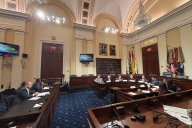You have /5 articles left.
Sign up for a free account or log in.
- The provosts of 11 public universities in the Midwest (the Big 10 except for Northwestern University, which is private, plus the University of Illinois at Chicago) have published a letter in Business Week taking exception to quotes attributed there to Drew Faust, Harvard University's new president. Faust was quoted last month as expressing concern about the state of federal support for research. She predicted to the magazine that Harvard and a few other elite universities would be fine. "They're going to be -- we hope, we trust, we assume -- the survivors in this race," she said. The article went on to say: "As for the many lesser universities likely to lose market share, she adds, they would be wise 'to really emphasize social science or humanities and have science endeavors that are not as ambitious' as those of Harvard and its peers." To provosts at Big 10 universities, those are fighting words. The provosts' letter said that they "emphatically reject" the idea that they should settle for less ambitious research. The letter acknowledged that budget limits have hurt public universities, but went on to say that the solution is providing these universities with adequate funds, not diminishing their role. "If we are to continue the extraordinary process of discovery and creativity that is the hallmark of our great research universities, we must be willing to provide the support our public institutions need to sustain their educational and scientific excellence. The ultimate stakeholder is the nation. And the stakes are high," the letter concluded. Harvard officials could not be reached, but have been quoted in The Harvard Crimson, the university's student paper, as saying that Faust's quotes in Business Week were taken out of context.
- Student turnout was apparently up -- and favored Barack Obama -- in New Hampshire's primary Tuesday. Among eligible voters under the age of 30, 37 percent voted, an increase from 18 percent in 2004 and 28 percent in 2000, according to data from the Center for Information & Research on Civic Learning & Engagement, a nonpartisan group. In both the Democratic and Republican races, candidates who lost the primary showed their support with younger voters, according to exit polls from The New York Times. While Obama won 37 percent of the vote overall, he was backed by 60 percent of voters aged 18-24. On the Republican side, Ron Paul came in fifth overall, but in the 18-24 demographic, he came in second, according to the Times poll.
- Congressional earmarks for specific research and development projects -- long criticized as pork-barrel politics and a poor way to finance science -- were largely absent from 2007 appropriations bills, but are back and in a big way. An analysis from the American Association for the Advancement of Science found that Congress included $4.5 billion in earmarks in 2008 appropriations bills -- much more than in previous years. Much of the increase, however, is due to new budget rules that make many earmarks more visible than they have been in the past, when they may not have been detected.
- Nearly 4,000 students at Arizona's public colleges and universities were denied in-state tuition rates this year because they could not demonstrate that they had the legal right to be residents of the state, The Arizona Republic reported. Most of the students are from community colleges and some also lost access to state financial aid.
- California State University at Fresno, which in 2007 lost two multimillion-dollar lawsuits alleging gender bias in athletics programs, and settled another suit for millions more, announced this week that it is adding two women's teams: swimming and diving, which last competed in 2003-4, and lacrosse, a new women's sport for the university.
- Prairie View A&M University's women's basketball program got thumped by the National Collegiate Athletic Association Tuesday. Citing a pattern of major violations, the association's Division I Committee on Infractions put the university on four years' probation, cut women's basketball scholarships to 12 from 15 for three seasons, and limited its practice time and the number of recruiting visits its coaches can take. Coaches held improper practices and gave players small amounts of cash, and the university's athletics department was marked by an "environment of noncompliance" with NCAA rules, the infractions panel said.
- Sometimes a campus scene may be real but the impression it gives may be false. The BBC this week investigated the way an unaccredited university based in London has duped foreign students -- in part by filming ceremonies in public spaces at the University of Cambridge and the University of Oxford, giving the appearance of links to such esteemed institutions.








